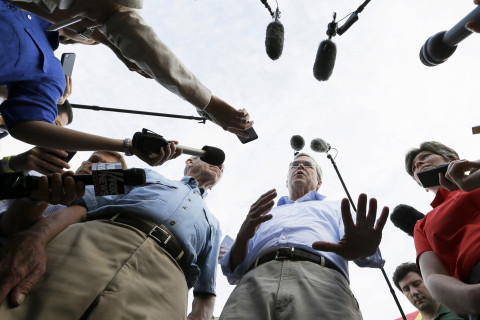
Teams of reporters are cornering candidates in Iowa and New Hampshire, and pressing them to pay attention to issues that are often ignored.
There are over 56 million Americans with disabilities. Tens of millions more are caregivers or family members of people with disabilities. In fact, pretty much everyone is at most one degree of separation from someone who is disabled. This is a large population that has all hallmarks of a powerful political constituency. Its members are diverse, stretching across the population; they are aware of their rights; and they rely on government officials to enforce the ADA, fund programs like Social Security Disability Insurance (SSDI), and otherwise work to make American society more inclusive and accessible. Other well organized political groups, such as gun owners or the elderly, have long since found ways to push their issues into the national political dialogue, tapping wealthy donors and organizing interest groups like the NRA and AARP. Why not disabled Americans?
One issue, says Jennifer Laszlo Mizrahi, the CEO of RespectAbility, is the conventional wisdom that all people with disabilities are Democrats fixated on government spending. She told me, “Democrats take the group for granted, and Republicans don’t reach out to it,” even though her data says that disabled Americans are much more interested in opportunity than government benefits. That’s an approach that could easily bridge both sides of the aisle.
The complexities of disability culture, though, also come into play. Many disabled individuals reject the word disability, claiming only their specific diagnosis or dismissing language of impairment all together. Stigma forces many people with invisible disabilities to pass as typical if they can. Voting sites are not always fully accessible, depressing the percentages of disabled voters in any region. Disability-rights organizations tend to be focused on promoting and shaping specific policies, brilliant in their wonky advocacy, but perhaps less focused on broad political impact. Finally, it’s possible that the fact that disabled Americans come from all political parties, races, classes, religions, and regions makes it difficult to build political coalitions around electing specific candidates. And yet, disabled people have specific needs that the political process seems to be ignoring.
They are avowedly nonpartisan, but they are in Iowa and New Hampshire to shape the news, not just cover it.
As the presidential election cycle got underway in 2015, Mizrahi launched a new approach to make every candidate think about the issues most important to disabled Americans. Instead of forming a super-PAC or trying to influence specific candidates through donations, she found funding to hire a group of fellows and send them out into the field. Many of them are disabled. All of them are keenly aware of the major issues facing the community. They would act as journalists, writing reports under the editorial oversight from Communications Director Lauren Appelbaum. When possible, RespectAbility would obtain press credentials for fellows, getting them access to post-debate “spin rooms” and press conferences. Otherwise, the fellows would do what reporters have always done—log the miles, ask the questions, and report on the answers.